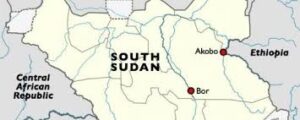The Anyuak community in Akobo County, Jonglei State, has publicly rejected a recent state government order creating new payams in the county, calling the move a unilateral act that could provoke inter-communal violence and further marginalize them.
The decision, taken by Governor Riek Gai Kok, is part of a broader state initiative to create new payams and bomas — local administrative divisions — which the governor argues will improve service delivery. In Akobo County alone, the order established 17 new payams.
However, community leaders say they were not consulted and that the restructuring of their ancestral lands is being done to benefit the Nuer ethnic group, particularly the Mor Lou Nuer, without their consent.
Speaking to Radio Tamazuj on Saturday, Philip Omot Jook, an Anyuak paramount chief, expressed deep disappointment with the governor, who is also from Akobo. He challenged the state government to improve services in the existing units rather than create new ones without community input.
“As an elder, a veteran politician, and a son of Akobo, our hopes were high following the appointment of Riek Gai as a governor, hoping he would end the decade-long marginalization of the Anyuak in the state,” Jook said. “Instead, the governor is creating new payams without consulting the Anyuak and while the old payams lack services.”
Jook declared the community’s condemnation of the “baseless” order and stated that it would isolate the Anyuak. He proposed a more radical solution, suggesting that lasting peace would only be achieved if Akobo County were formally divided.
“The Mor Lou Nuer should have a county established in their indigenous homeland of Walgak and Diror, while the rest of Akobo, as defined by the boundaries of January 1, 1956, remains the county for the Anyuak community,” he said.
Echoing the sentiment, a local youth leader, Lily Okongo, said the community feels neglected and that their land is being carved up for others.
“Our ancestral lands are being restructured into payams and bomas for the Nuer without our consent. So where will we go?” Okongo said. “As youth, we join our elders in condemning the creation of new payams.”
Okongo detailed a broader sense of political exclusion, stating that no Anyuak individual holds a ministerial or commissioner position in the state government and that the community is often excluded from peace conferences and other official activities.
“We have been in Alali since the 2013 war without government services or humanitarian aid,” Okongo added.
The community’s concerns found support from civil society.
Bol Deng Bol, executive director of the advocacy group INTREPID South Sudan, urged dialogue to address the grievances.
“I sympathize with the Anyuak for their lack of political and social representation in the state. You see only Dinka and Nuer dominating the state,” Bol said. “On the issue of new payams in Akobo, it is not good that they were not consulted. As a person having a claim of something and decisions are made without your consent is worrying and could trigger violence.”
He called for the state to engage with the Anyuak and other communities with grievances to prevent further escalation.
The governor’s office could not immediately be reached for comment.




